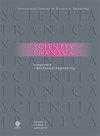Sustainable thermochemical energy storage through eco-friendly zeolites - A characterization study
IF 1.9
4区 工程技术
Q2 ENGINEERING, MULTIDISCIPLINARY
引用次数: 0
Abstract
Judicious utilization of natural resources always helps protect the environment from several ill-effects. This paper was aimed at exploring the merits of natural and environment friendly zeolites towards sustainable thermochemical energy storage. Sorption behaviour of selected zeolites were investigated using a differential thermogravimetric analyser. The desorption kinetics was studied by heating the materials from room temperature to 600 °C. The materials lose their water molecules on heating and become anhydrous mostly around 300 °C. The desorption enthalpies due to heating were noted to decrease with increase of heating rate, and found low for Zeolite-Mordenite (334.5 J g-1) and high for Molecular Sieves-4A (1060 J g-1). Materials’ adsorption enthalpies were determined by subjecting them to single cycle tests comprising of heating, cooling and hydration processes in sequence. The desorption and adsorption enthalpies of a single cycle were found to vary with the material and temperature program used. To understand the desorption and adsorption kinetics better, the materials were also tested on X-ray photoelectron spectroscopy, Brunauer–Emmet–Teller, and thermal constants analysers respectively for their elemental composition, structural properties, and thermal conductivity. This paper concludes that many of the naturally available zeolites stand as potential candidates for a sustainable thermochemical energy storage and recovery.生态友好型沸石可持续热化学储能的表征研究
明智地利用自然资源总是有助于保护环境免受一些不良影响。本文旨在探讨天然和环境友好型沸石在可持续热化学储能方面的优点。用差示热重分析仪研究了所选沸石的吸附行为。通过将材料从室温加热到600℃,研究了解吸动力学。这些材料在加热时失去水分子,在300°C左右变得无水。升温解吸焓随升温速率的增加而降低,沸石-丝光沸石的解吸焓较低(334.5 J g-1),分子筛- 4a的解吸焓较高(1060 J g-1)。材料的吸附焓由加热、冷却和水化过程组成的单循环试验确定。发现单循环的解吸和吸附焓随所用材料和温度程序的不同而变化。为了更好地了解脱附和吸附动力学,我们还分别用x射线光电子能谱、brunauer - emet - teller和热常数分析仪对材料进行了元素组成、结构性质和导热系数的测试。本文的结论是,许多天然可用的沸石是可持续热化学能量储存和回收的潜在候选者。
本文章由计算机程序翻译,如有差异,请以英文原文为准。
求助全文
约1分钟内获得全文
求助全文
来源期刊

Scientia Iranica
工程技术-工程:综合
CiteScore
2.90
自引率
7.10%
发文量
59
审稿时长
2 months
期刊介绍:
The objectives of Scientia Iranica are two-fold. The first is to provide a forum for the presentation of original works by scientists and engineers from around the world. The second is to open an effective channel to enhance the level of communication between scientists and engineers and the exchange of state-of-the-art research and ideas.
The scope of the journal is broad and multidisciplinary in technical sciences and engineering. It encompasses theoretical and experimental research. Specific areas include but not limited to chemistry, chemical engineering, civil engineering, control and computer engineering, electrical engineering, material, manufacturing and industrial management, mathematics, mechanical engineering, nuclear engineering, petroleum engineering, physics, nanotechnology.
 求助内容:
求助内容: 应助结果提醒方式:
应助结果提醒方式:


